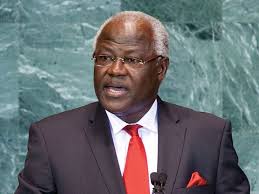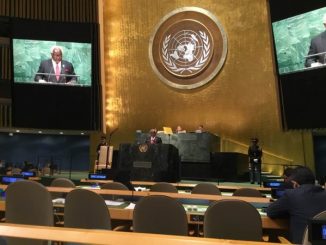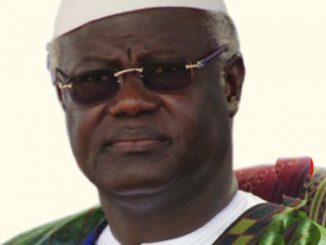
SLPP FOOLED SIERRRA LEONEANS : EX-PRESIDENT ERNEST KOROMA AND THE APC GOVERNMENT WERE REALLY THE FIRST TO WIN THE MCC COMPACT IN 2013 BUT THE AWARD WAS RELEGATED THE FOLLOWING YEAR FOR “DATA NOISE “
By KABS KANU
I am busy investigating what is happening with the MILLENNIUM CHALLENGE CORPORATION ( MCC ) Compact Award won by President Maada Bio last year and why Sierra Leone has still not been called to develop a compact .
While that investigation is going on, I want you to know that President BIO his noisy wife Fatima Bio and their SLPP acolytes fooled Sierra Leoneans last year when they rejoiced that they were the first to win the MCC Compact.

Ex-President Ernest Koroma
According to MCC documents I am going to post, Sierra Leone first won the MCC Compact in 2013 during the reign of former President Ernest Koroma but the award , according to the MCC, “ was relegated to a Threshold the next year when it fell short on the scorecard (largely due to data noise than a decline in actual fiscal performance ) . But now Sierra Leone passes the scorecard again…” so MAADA BIO WAS NOT THE FIRST TO WIN THE COMPACT .
Read the full document below :
5 Countries to Watch at MCC’s FY2021
DECEMBER 9, 2020
Jocilyn Estes and Sarah Rose
On December 15, the Millennium Challenge Corporation’s board of directors will hold its annual country selection meeting (the last of the Trump administration), identifying which countries will be made newly eligible for the agency’s funding. Every year CGD’s US Development Policy team highlights key issues the board will grapple with and predicts which countries the board will choose for compacts—large, five-year grant programs—and which it will select for threshold programs—smaller, more limited grant agreements. (See here for a quick overview of MCC’s country selection process). This blog post focuses on some of the top candidate countries and the most interesting decisions in play for FY2021: Sierra Leone, Benin, Côte d’Ivoire,
Overall, we anticipate another small year for MCC in terms of new partnerships. The agency already has seven bilateral compacts under development (with Indonesia, Kosovo, Lesotho, Malawi, Mozambique, Timor-Leste, and Tunisia), and is in the process of developing its first ever regional compact(s) in West Africa. Even in a normal year, this would be a full plate. When you factor in the global pandemic, which has put up operational hurdles and fomented economic uncertainty, MCC almost certainly doesn’t have the scope or appetite to add a lot of new countries to its list.
While observers typically focus attention on the selection of new countries, the board will also decide next week whether countries currently developing compacts with the agency demonstrate good enough governance and maintain a productive enough relationship with MCC to continue compact development. As always, these promise to be some of the most interesting—and challenging—decisions.
Sierra Leone: The most likely choice for new compact selection
Sierra Leone is nearing completion of its MCC threshold program focused on water and energy sector reforms, so the timing is good to begin to shift the focus of the partnership to a possible compact .
MCC has had its eye on Sierra Leone for years. The board originally picked it for compact eligibility in FY2013, but relegated it to a threshold program the next year when it fell short on the scorecard (largely due to data “noise” rather than a decline in actual policy performance). But now Sierra Leone passes the scorecard again (for the second year in a row) with high scores on the indicators MCC weighs most heavily—those measuring control of corruption and democratic governance. Sierra Leone’s competitive 2018 elections brought an opposition party to the presidency and the new administration—along with the legislative branch—continue to make efforts to combat corruption. In addition, Sierra Leone is nearing completion of its MCC threshold program focused on water and energy sector reforms, so the timing is good to begin to shift the focus of the partnership to a possible compact.



